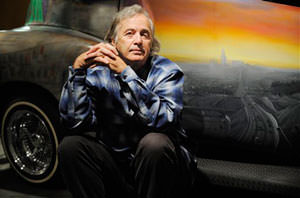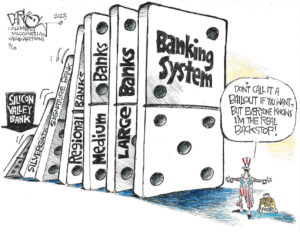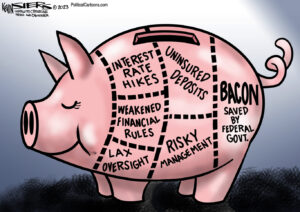Exclusive: Ry Cooder’s ‘No Banker Left Behind’
The legendary musician tells Robert Scheer that his new album, including a song inspired by one of Scheer's Truthdig columns, was written out of feeling frustrated, helpless and angry with current events.The legendary musician tells Robert Scheer that his new album was written out of feeling frustrated, helpless and angry with current events.
The legendary musician tells Robert Scheer that his new album, including a song inspired by one of Scheer’s Truthdig columns, was written out of feeling frustrated, helpless and angry with current events.
Listen to the first track, “No Banker Left Behind,” previewed exclusively on Truthdig, and a discussion about the new album on Truthdig Radio below. Let us know here if you want to be alerted when tickets go on sale for a Ry Cooder concert in September benefiting Truthdig.
Kasia Anderson: This is Kasia Anderson, associate editor at Truthdig. I’m here with Robert Scheer, our editor in chief, and also the musician Ry Cooder, who has written a song based on one of Bob Scheer’s recent columns, called “No Banker Left Behind.” And before we get into our discussion, let’s play that track.
[Music]
Kasia Anderson: That was “No Banker Left Behind.” And as I understand it, Ry, there’s a bit of an origin story behind this track. Can you tell us about it?
Ry Cooder: Yeah, sure. We at the house, we read Truthdig pretty regularly. And I like to get up in the morning and find it there on the computer and open it up and see what’s what. And I saw this heading—this was during the bank … the whole business with the bailout. And, “No Banker Left Behind”—I said, that’s the voice of Uncle Dave Macon speaking to me. Uncle Dave, who was the very … at one time very well-known medicine show country musician—you’d have called him a banjo player—just the greatest, par excellence. And he had a great gift for making simple statements about life and about society. And this was also during the Depression; he was very popular at that time, made hundreds of records. And so he would take a thing like this and reduce it down to one little statement, and you heard this and you understood it completely, and by the end of the song you’d learned something. He was very entertaining; he’d dance while he played the banjo, and lived to be a very old man. So I thought, “No Banker Left Behind,” by Uncle Dave Macon … who … no banker left behind, what? The train. OK, they’re on the train, the train’s leaving. Why? Because it’s a rich train for only bankers. They’ve got all the money, they get on the train, the train pulls out, and the rest of us all stand there watching and saying, where’d it all go? You know, how did they make off with all this loot? And then it was a matter of telling a little story of going to the White House, what they’re going to eat when they get on the train, and with Uncle Dave in mind. So it was a pretty simple little thing to do, to get the record started.
Robert Scheer: You know—and it’s not even my favorite track on your record—you know, it’s interesting. I was saying before, sometimes your friends work on movies or they make records or write books. And then they want you to listen to it or look at it. And you just don’t want to say the wrong thing if you don’t like it. And somebody once told me if you see your friend’s movie and you didn’t like it at all, you say to them, “You must be very proud.” [Laughter] There’s a couple of screenwriters told me that once, and that gets you off the hook. And so when you gave us this record—and it’s coming out in September—and you know, I was flattered that you said one of the songs was inspired … well, I listened to it, and I could not stop listening to it. I listened to it over and over again. And I paid you a compliment … where as far as the content, I think it’s right up there with John Lennon’s “Working-Class Hero,” which I think trumps just about anything else as far as taking serious political observations and putting them into music. I just do, I think it’s just a great album. And I listened to this over and over, and the range of content—I’m not talking about the music, now; I think the music also has great variety and is fabulous, but that’s to be expected. But you deal with immigration; you deal with war and peace; you deal with the financial crisis; you actually deal with race. It’s startling. This is an intensely political album, you know. So what is this? Is this your manifesto?
Ry Cooder: Yeah. Well, some of this must come from me being quite frustrated and feeling sort of marooned in all of this—you know, like, helpless. I get so angry. And I try not to dwell in that, because it’s bad mental health; it’s bad for you. The best thing I can do is to take an issue or a story, or something that’s coming up in current events, or something I know about—such as recruiting children in the military in poor schools in Los Angeles, the most heinous kind of atrocious thing there ever could be. So you sit and pound the table and feel terrible—I said, no, make a song out of it. At least then you can record it, and go through the exercise of doing that, and the thought of doing that, and the creativity. And it’s fun, besides; I like to do it. So by the time I get done with one of these songs, it feels somehow, you know, that there’s something good about it rather than just something terrible coming in. And then, after we get a few of them, maybe it’s a record; you know, maybe we can call it a record.
Robert Scheer: You know, what’s happening to this industry? We’re here doing this recording at Pacifica, and when we’re done we’re going to have an appeal for funds and keep this station on the air. And we have this appeal for Truthdig, to keep it going. But you’ve been—Rolling Stone said you’re No. 8 on the list of the hundred greatest guitar players and, you know, maybe you’re the greatest living guitar player. And yet I was surprised—you told me your really one big success was the Buena Vista Social Club, the Cuban, the old Cuban guys that you pulled together.
Ry Cooder: Yeah. That was the one that people seemed to like the best, yeah.
Robert Scheer: Yeah. And that, you know, that it’s hard to get a record out there.
Ry Cooder: Very hard.
Robert Scheer: It’s hard. So what’s happening to this industry … ?
Ry Cooder: Well, I grew up at a time—and I know you did, too—the heyday of the record business, which my friend Chris Strachwitz of Arhoolie Records believes is a one hundred year business: started with Caruso in 1908, or 1906, if you like—first million seller; was done, basically in a shambles, by 2006 or so. So during that time, and especially after World War II when the LP was developed and radio began to play a great part in promoting these songs, and people wanted to buy them—I did; I’d hear a song on the radio and go out and ask the guy in the record store. And record stores were everywhere, and the little single cost 99 cents, or 50 cents some places; and the records, the LPs, cost $5.99. And I got my first John Lee Hooker record—and I guess I was in junior high school—in a drugstore, on the rack; we used to call them rack jobbing. And this thing cost, I think, $3.99. It was a whole world, there, of sound. And I sat down and tried to learn to do it. So I guess every day of my life, from early childhood on, you know, I spent with these records and the instruments, trying to understand it; trying to absorb it. And it never occurred to me that this was the music of the days of your life. You talk about John Lennon, for instance, or Walter Gieseking on piano, whichever you prefer. And it could be anything, depending on your state of mind or what you’re thinking of—what you’d like to see in your mind, the beautiful visualization that music brings. The understanding that it brings; the insight from great music. I mean, my goodness, at a price anyone could afford, you know, anytime you wanted. How can you improve on that? It’s fantastic—and now it’s all gone. It was records, radio and retail—the three R’s. So the retail outlets basically dried up; the radio is not about that anymore. This radio station is all, I guess, there is. I mean, I listen to Mexican radio stations, it’s true, because I like to hear banda and I like to hear norteño. But I mean, for content and for inspiration, it’s getting kind of hard now. But I still do this, because it’s … it’s all I’m equipped to do, you know.
Kasia Anderson: I’ve got a question. Just listening to the album, there’s quite a mélange of different styles going on. Can you tell us a little bit about your songwriting process? Do you have a concept first and then choose the style of music, or does it all kind of come to you?
Ry Cooder: Yeah … first you need an idea. No banker left behind, Uncle Dave Macon—let’s go there. We’re going to work pretty well. Then, if you’re going to have, let’s say, “The Corrido of Jesse James” where Jesse James asks bilingually: God, give me back my gun, so I can go down to Wall Street and in the manner that I was accustomed to, take care of business—he doesn’t realize that one man, one gun doesn’t work anymore. He’s kind of a naive fellow, Jesse James. So that’s going to be in that accordion style, the conjunto style; I added banda horns in there because it’s exciting. And so I saw that pretty clearly. John Lee Hooker running for president, infomercial about his campaign—you do it in the style as much as you can. I spent a lot of years playing along with his records and knowing him, even, personally. So I thought I’d try that, you know, and see if you can evoke that feeling. But that’s what musicians do, looking for inspiration through the music, through the instruments. But you do need—these are topical songs, so we need the themes; you know, the girl in the army, enlisting in the army; the person trying to cross the border in Sonoita, Arizona, and getting busted by the … that’s everywhere. We hear this story all the time. So … the maid arguing with the guy in the big house, about values, and what life’s all about.
Kasia Anderson: A timely topic. [Laughter] Maids, and big houses, yeah.
Ry Cooder: Yeah, you bet. [Laughs]
Robert Scheer: You know, I just want to throw in a little optimistic note here. And I think it applies to your business as well, but I feel it with the journalism activity that we do on Truthdig. It’s true, we haven’t figured out a way to make real money here. And I guess if we follow the lead of some others and sell ourselves to some very big operation, maybe we’ll do OK. But you know, as an independent voice, it’s rough. On the other hand, we have no trouble reaching people.
Ry Cooder: No, that’s good.
Robert Scheer: You know, we were discussing earlier that Chris Hedges gave this speech at one of our fundraisers; it was the night bin Laden was shot; he gave a little impromptu speech; we transcribed it right away; it’s brilliant, as Hedges always is. And we had 100,000 people come to it in a matter of hours. And I know we’re going to do that with this album of yours. It’s coming out in September. And I think, through the Internet, we can. Now, I don’t know if it turns into record sales; I don’t know how iTunes works; I don’t know …
Ry Cooder: I have no idea. No idea.
Robert Scheer: But you know, it seems to me that the Internet is a great vehicle for letting people in on something. And if we do our job right, you know, and we promote this record, it will be a very good test for us. You know, we want to really push it. It comes out in September, and I’d like to see if we can’t find a big audience for it.
Ry Cooder: Well, I think your audience is right there.
Robert Scheer: Yeah, but not only our audience. We want to share it with The Nation, and AlterNet, and all the other folks that are out there; you know, they’ll steal it anyway, so we might as well share it. [Laughter] In a good spirit; I don’t mean they are, particularly, thieves. But you know, the Internet is a place where people—you know, my column this morning was grabbed on about 10 different sites before I read it on Truthdig.
Ry Cooder: Wow.
Robert Scheer: Why not take advantage of that, get the word out. And then, I think—and you said you’re not familiar with it—but I think with something like iTunes or something, you must get some income … no?
Ry Cooder: Not that I know about. It’s tiny. The artist is usually at the bottom of that food chain.
Robert Scheer: Oh, OK. Well, that’s depressing. But anyway, as far as getting the music out, and getting the content of it out, I think the Internet is an incredible vehicle. And you know, someday we’ll figure out how to make a little money off it.
Kasia Anderson: Well, speaking of the Internet, I think this is the point where we’re going to share some of the message on Truthdig.com. And we will start by playing another track from the album. And Ry, can you set that up for us? It’s track nine, another of our favorites.
Ry Cooder: I don’t know how I got to this John Lee Hooker for president idea, except that I began to hear him campaigning. And hear him telling you, the audience, what politics means to him. … He was a very funny fellow, John Lee Hooker. He had a very interesting view of the world, and tremendous language; I just loved to hear him talk. And so, if he did run for president, what would be important, you know? And then juxtaposed along with certain issues like the horrible failure of the Supreme Court to do the right thing—what would he do about that? Would he reorganize the court? Who would be his running mate? [Laughter] You know, Jimmy Reed for vice president. And so forth. And then, so to extrapolate, I took certain passages out of some of his songs where he talks about himself, and just reworked the language a little bit. But I just like to play his music myself on guitar as best I can. It’s something that I like to listen to, and he’s not around to do it anymore.
Kasia Anderson: Let’s hear a couple of minutes from that track, then.
[Music]
Peter Scheer: That was Ry Cooder, singing a song off his new album, “Pull Up Some Dust and Sit Down,” which comes out in September … . That’s it for this week’s Truthdig Radio. Catch us next week. Thanks for listening.
Your support matters…Independent journalism is under threat and overshadowed by heavily funded mainstream media.
You can help level the playing field. Become a member.
Your tax-deductible contribution keeps us digging beneath the headlines to give you thought-provoking, investigative reporting and analysis that unearths what's really happening- without compromise.
Give today to support our courageous, independent journalists.




You need to be a supporter to comment.
There are currently no responses to this article.
Be the first to respond.